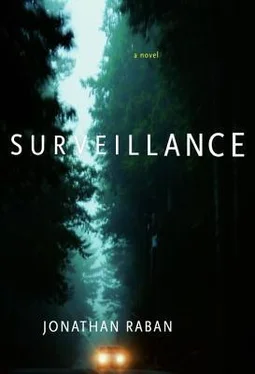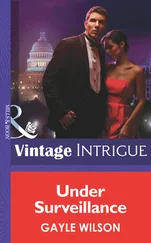“Oh, yeah, I got to be a champion wrestler in D.C. And in Seattle, too, back then. You know how it is. I bet you’ve slapped a few faces in your time.”
Lucy heard Alida say, “Like when I was at preschool, I used to think Hitler lived on Bainbridge Island….” What was this about?
Minna leaned toward Lucy. “Had to slap Augie’s once. Right around the back of the bank. He was getting fresh before we even got inside the car.”
Augie was saying, “Nah, that dog won’t hunt, Alida.”
Minna said, “That old Ford of his, it was a wreck. His students used to laugh at him for driving it. But he had such a way with words.”
“Hey, what are you two yakking about down there?”
“Mind your own beeswax,” Minna said; then she and Lucy cleared the plates from the table.
There was blackberry cobbler for dessert, wolfed down by Alida. “Yummy!” she said to Minna, suddenly a child again.
“At CollierParnell,” Lucy said, “did you work closely with an editor?”
“Oh, yeah — Charlie Shaw. Good man. He made me empty my box of commas. Come to think of it, he just about eviscerated my entire system of punctuation. He was big on what he called ‘sentence speed,’ and thought my grammar was too fussy and academic.”
“But the text itself? Did he ask for revisions or like suggest incidents that were needed here and there?”
“No, he hardly changed a word. He just pulled out all the punctuation.”
At least the issue had been broached, and Augie seemed to take it in stride. When Alida left the table to go to the bathroom, Augie looked at Lucy and shook his head from side to side. “She’s a delight.”

WAKING EARLY Saturday morning to the first slivers of gray light between the blinds, Lucy heard the irregular chatter of typewriter keys coming from Jefferson’s library across the hall. What was he writing now? A sequel to his blockbuster, a Horatio Alger story of a poor European boy making good in rich and generous America, or one of his dry-as-dust polemics for Foreign Policy magazine? Whatever…Listening to the pleasant, distant clackety-clack-clack of Augie at work in the gloaming, she fell asleep again, only to wake up, almost immediately it seemed, but actually two hours later, to the sound of a piano down below: over and over again, the same sequence of notes, though never twice in exactly the same rhythm. Then came a deep, resonant chord struck first hesitantly, experimentally, then again with confident force.
She took a shower, giving a wide berth to the hostile scale on the bathroom floor. Her weight had begun to frighten her lately, a problem she dealt with by hiding it under muumuus and shunning those escalating red digital numbers. She dressed to the accompaniment of Augie exercising his democratic freedoms at his Steinway grand, then poked her head into Alida’s room next door. The bed was empty, and it looked as if she’d upended her bag and shaken out every piece of clothing in a tumbled heap.
Downstairs, Augie was alone, sitting at the piano.
“Poor old Schubert. What did he ever do to deserve the way I murder him? Alida went off to the beach, Minna likes to sleep in on weekends, there’s coffee over there.”
From the squared-off kitchen area, Lucy called, “Do you want some?”
“No, I’ve been tanking up on caffeine since five-thirty.”
“Do go on playing. I like it — even if the piano’s better than the pianist. How long have you been learning?”
“Three months. From scratch. I couldn’t read a note of music when I started.” He tinkled out a few bars.
“Sounds like you’re doing great.”
“If I could learn to play just this one sonata semi-fluently before I die…” He went back to practicing a wobbly arpeggio, not at all embarrassed by Lucy’s presence.
She found it pleasant to sit on their cruddy old sofa, sipping at her coffee and listening to Augie hacking away, banana-fingered, at the keys. During a pause, she said, “Is that in A major?”
“B flat. Number Twenty-one. His last.”
Behind Augie’s halting notes, she was beginning to hear the ghost of a performance on disk that she was sure she had at home. There was something more than mildly megalomaniacal, she thought, about an absolute beginner tackling a work so obviously difficult and emotionally lavish. But that was Augie, and being Augie he’d most likely crack the sonata before his deadline. Still, it was strange that a man so ambitious and doggedly competent should have failed to make full professor at UW — or was it that only in retirement, in his new life on Whidbey, that he’d uncovered in himself this ferocious willingness to beat the odds?
His practice was interrupted by a string of thin electronic beeps. Augie shut off the alarm on his watch and closed the piano lid. “Two hours,” he said. “My daily stint.”
“You’ve read The Pianist ?” Lucy said offhandedly, looking at the piano rather than at him.
“Oh, didn’t they turn that into a movie? No, I haven’t read it. Ironically, as a historian I’m not that big a fan of memoirs. Of course they have their uses, but their narrators are chronically unreliable.”
“You might like this one, just for the bits about music.”
“I’ll have to check it out,” Augie said, his tone of voice suggesting that this wouldn’t happen anytime soon.
“The odd thing is that Sp — Spuzz — Szpilman saw almost the exact same thing as you did. Like when you were in Lodz…is that how you say it?”
Augie laughed. “You mean Wootsh ?”
“Wootsh?”
“L, O, D, Z. Wootsh.”
“Wow.”
“Poles are tricky that way. Lot of others, too. Yeah, Wootsh?”
“Well, when you were in…Wootsh…with those two other kids, and you saw the Nazis throwing an old Jewish guy with arthritis out of a window in his armchair? The guy who wrote The Pianist —however you say his name — he described pretty much the same thing: Nazis throwing an old man in an armchair out of a high window in the ghetto in…is it Warsaw?”
“Funnily enough, Warszawa’s pronounced pretty much like Warsaw. Polish inconsistency, you see.”
“I was struck by the coincidence.”
“Why?”
“Well, these two old guys in armchairs, both hurled out of windows…it all seemed so shockingly particular that I was kind of amazed to read of it happening in two different places. Warsaw, and Wootsh, you know?”
“No surprise to me. Face it, Lucy, in war brutality gets to be fun, and like every other kind of fun, like football or checkers, brutality develops its own rules. It gets conventionalized. Remember the pictures that came out of Abu Ghraib? They were of jocks having fun, playing games by the rules. All those human pyramids of naked prisoners? Naked guys on all fours being led around on a leash by a grinning woman? Hooded guys with electrodes attached to their testicles, strung up like carcasses in a butcher’s? It was ritualized play, like a frat-house hazing. The players weren’t making up that stuff as they went along, they were going by the rulebook, playing the torture and humiliation game.
“The Nazis were like that. It was a game for them to empty out the tenement buildings of the cities they invaded, especially in the ghettos. Architecture had a lot to do with it: think tall sash windows, with sills just a foot or two above the floor. You raise the sash, you create a space just right for a person in a chair. If some old guy can’t get up when you break into his apartment, it’s out the window with him. Do that once, you electrify the entire goddamn ghetto, and you’ve got a new move. Word gets around: here’s a trick pour encourager les autres !”
Читать дальше













